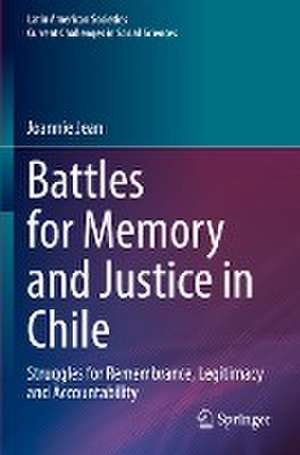Battles for Memory and Justice in Chile: Struggles for Remembrance, Legitimacy and Accountability: Latin American Societies
Autor Joannie Jeanen Limba Engleză Paperback – 17 feb 2024
Battles for Memory and Justice in Chile: Struggles for Remembrance, Legitimacy and Accountability will be of interest to researchers from different disciplines and fields of study within the human and social sciences, such as sociologists, historians and anthropologists working in fields such as Latin American studies, sociology of memory, sociology of social movements and human rights studies.
| Toate formatele și edițiile | Preț | Express |
|---|---|---|
| Paperback (1) | 676.02 lei 38-44 zile | |
| Springer International Publishing – 17 feb 2024 | 676.02 lei 38-44 zile | |
| Hardback (1) | 783.50 lei 6-8 săpt. | |
| Springer International Publishing – 17 feb 2023 | 783.50 lei 6-8 săpt. |
Preț: 676.02 lei
Preț vechi: 889.51 lei
-24% Nou
Puncte Express: 1014
Preț estimativ în valută:
129.36€ • 136.03$ • 106.89£
129.36€ • 136.03$ • 106.89£
Carte tipărită la comandă
Livrare economică 12-18 aprilie
Preluare comenzi: 021 569.72.76
Specificații
ISBN-13: 9783031255366
ISBN-10: 3031255364
Pagini: 196
Ilustrații: XX, 196 p. 4 illus.
Dimensiuni: 155 x 235 mm
Ediția:1st ed. 2023
Editura: Springer International Publishing
Colecția Springer
Seria Latin American Societies
Locul publicării:Cham, Switzerland
ISBN-10: 3031255364
Pagini: 196
Ilustrații: XX, 196 p. 4 illus.
Dimensiuni: 155 x 235 mm
Ediția:1st ed. 2023
Editura: Springer International Publishing
Colecția Springer
Seria Latin American Societies
Locul publicării:Cham, Switzerland
Cuprins
Chapter 1: Introduction.- Chapter 2: Theoretical and methodological framework.- Chapter 3: The year that changed everything (1998-2000).- Chapter 4: Renewal of the struggle and Pinochet's final dance with justice (2001-2008).- Chapter 5: Disappointed hopes and the return of the Right (2009-2010).- Chapter 6: Making memory an object of the present and human rights an object of debate (2011-2013).- Chapter 7: Today and tomorrow (2014-2018): a question of impunity.- Chapter 8: Conclusion: Politics of Memory and Political Disaffection: Between Collaboration, Distrust and Disapproval.
Notă biografică
Joannie Jean completed a B.A. in History (2009), a DESS in post-secondary teaching (2010), an M.A. in Anthropology (2013) and a PhD in Sociology at the University of Ottawa in 2018. Her master’s thesis explored the relations between memory and representations of the past among the families of the detained-disappeared. Her interdisciplinary PhD research undertook the reconstruction of the main debates that arose around the question of impunity, truth and memory in Chile. Based on the discourses produced by seven organizations located in Santiago and by formal and informal interviews, she examined particular historical conjunctures in order to highlight the struggles over the meaning taken by the difficult past within the Chilean society while looking into the dynamics of contention at play. Her current work focuses on museums and their uses by different organizations to discuss the question of social movements, ethics and memory. She is currently conducting her post-doctoral research at the Université de Moncton.
Textul de pe ultima copertă
This book analyzes how the past and its representation in the public space have been a source of conflict in Chile since the end of the Pinochet regime. From a multi-disciplinary perspective (sociology, anthropology and history), it studies the work of seven organizations of memory and human rights in Santiago, Chile, the struggles in which they are engaged, and the main debates that have arisen in the country around the themes of impunity, truth and memory.
Covering the period from 1998 to 2018, this book begins its analysis with the detention of Augusto Pinochet in London and concludes with the end of the second term of Michelle Bachelet. The seven organizations studied range from family groups and survivors to sites of memory and consciousness. Through analyses of the discourses produced by these organizations, it examines particular historical periods(1998-2000, 2001-2008, 2009-2010, 2011-2013 and 2014-2018) by focusing on strong debates and events of these conjunctures in order to highlight the struggles of meaning and the conflicts of legitimacy relating to these times. In concrete terms, particular attention is paid to the analysis of the main themes of litigation, the way in which the actors are mobilized, their objectives and how the past is evoked in the public space.
Battles for Memory and Justice in Chile: Struggles for Remembrance, Legitimacy and Accountability will be of interest to researchers from different disciplines and fields of study within the human and social sciences, such as sociologists, historians and anthropologists working in fields such as Latin American studies, sociology of memory, sociology of social movements and human rights studies.
Battles for Memory and Justice in Chile: Struggles for Remembrance, Legitimacy and Accountability will be of interest to researchers from different disciplines and fields of study within the human and social sciences, such as sociologists, historians and anthropologists working in fields such as Latin American studies, sociology of memory, sociology of social movements and human rights studies.
Caracteristici
Analyzes the struggle of human rights organizations in Chile to preserve the memory of victims of the Pinochet regime Contributes to the international debate about politics of memory in post-dictatorship societies Adopts a theoretical framework combining sociology of memory













